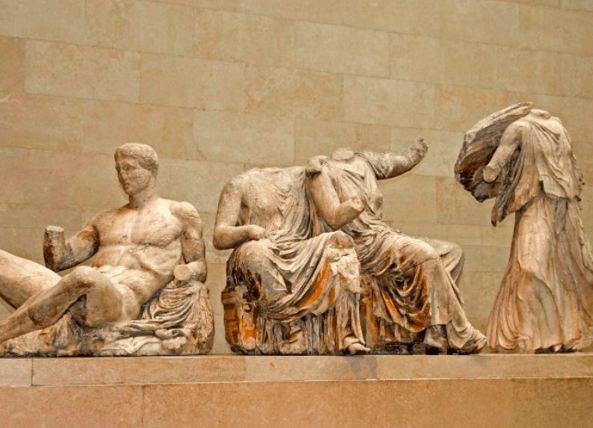
The first-ever legal bid for the UK to return the Elgin Marbles to Greece has been thrown out by the European Court of Human Rights.
The court has now ruled that because the alleged theft of the sculptures from the Parthenon took place more than 150 years before the UK signed up to the human rights convention, it did not have the power to consider the lawsuit.
The Athenian Association, who began this campaign for the return of the sculptures, pointed out that the court had not made a ruling on the “merits of the case”.
The marbles were taken from the temple by the Earl of Elgin in the 1800s and he then sold them to the British Government in 1816.
The Greek Government was given extensive legal advice from lawyers Amal Clooney (George Clooney’s wife) and Geoffrey Robertson, but seem to have decided against taking Britain to court.
Instead, the case against the UK was brought by the Athenians’ Association (a cultural group) after the British Government refused an offer last year by Unesco to mediate between Greece and Britain.
In the ruling, which was sent to the Athenian Association last month, the European court stated, “The Court notes that the marbles were removed from Greece in the early 19th century.
“In order to bring the matter within the temporal jurisdiction of the Court, the applicant has sought to rely on the refusal of the United Kingdom to enter into mediation with Greece concerning the return of the marbles and the continuing refusal to return the marbles.
“However, it is clear from the nature of the applicant’s complaints that its underlying grievance is the allegedly unlawful removal of the marbles from Greece. The removal having occurred some 150 years before the Convention was drafted and ratified by the respondent state, the applicant’s complaints would appear to be inadmissible.”
The judges also said the Athenians’ Association did not have “any right to have the marbles returned to Greece”.
The Athenian Associations’ legal representative, Vassilis Sotiropoulos, said the case was at least a “first step" and claims the judgement could actually help the Greek Government take legal action in the future.
“Globally, this first statement of the European Court, historically the first court judgement, on the subject of the Parthenon Marbles highlights the points that Greece should focus on with particular attention in her recourse against the United Kingdom,” Mr Sotiropoulos told English media.
“This decision leaves open the possibility of a recourse submitted by Greece being proclaimed admissible, thus also indirectly offering precious expertise on how to handle the case henceforth.”
Andrew George, of the British Association for the Reunification of the Parthenon Sculptures, said the ruling did not affect the arguments in favour of sending the sculptures back.
“We’ve learned nothing from this. There’s been no test of the merits of the case, just that this is not the arena to resolve the justice or otherwise of the case,” he said.
As reported earlier this month by Greek City Times, on the 10th of July, a cross-party group of MPs also launched a Bill to return the sculptures to the Acropolis Museum.

